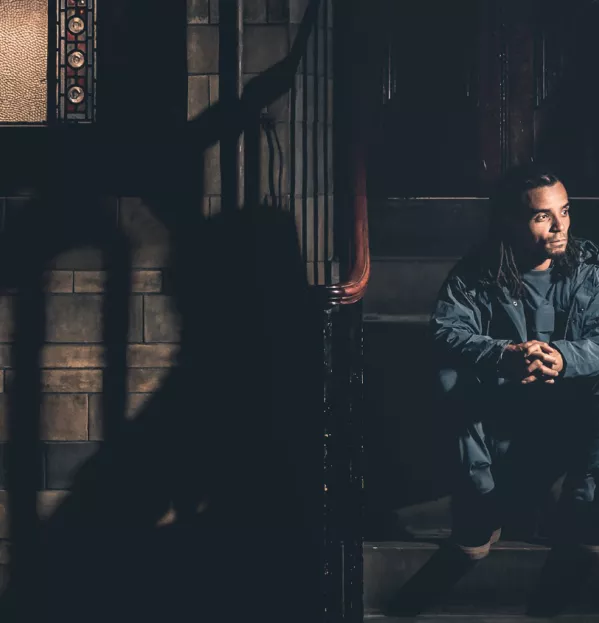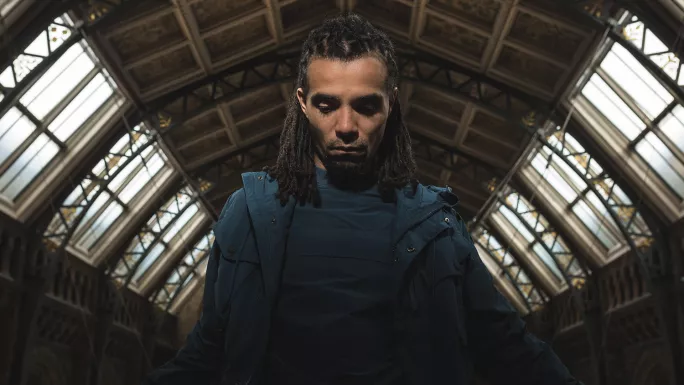
Tes talks to...Akala

At the age of 7, Kingslee Daley was in a special educational needs group for children who did not speak English. This was odd for multiple reasons. For one, Daley was born and bred in Archway, North London. For another, he spent a lot of his time at that stage in his life reading books such as The Lord of the Rings, which were aimed at much older age groups. And he read these books in English.
“When my Mum found out and confronted them [the school] about it, the first thing my teacher said was, ‘I admit to doing all these things, but it isn’t because he’s black’,” he explains. “But my mum hadn’t said anything about that issue.
“I don’t necessarily judge that woman [the teacher]. She was educated in the 1930s. I think it’s too easy to just point to her - a woman who was in her fifties in the 1980s - and say, ‘This is entirely your fault.’ She was socialised in that way.”
In his new book, Natives: race and class in the ruins of empire, out this month, he writes about other educational experiences, too.

“I go through a few incidents like that in my schooling,” he says. The book analyses British society through Daley’s experiences of British life as a child and later as a rapper, founder of the Hip-hop Shakespeare Company, a campaigner and a writer. If his name doesn’t sound familiar, it’s because he usually goes by his stage name, Akala.
There is a close focus on education in the book - and not much of what he has to say about it is complimentary. “What I try to show is the way inequalities are reproduced in our education system. Inequalities of class and inequalities of race aren’t accidental, but they are also not completely conspiratorial. It’s just the way society functions. [In the book] I take individual episodes that happened to me and I use the relevant scholarship to show this wasn’t an isolated incident of one bad apple, this is a general phenomenon.”
Despite negative experiences at school, Daley looks back on his education and feels lucky compared with his peers. His stepfather was stage manager of the Hackney Empire, which in the 1980s and early 1990s staged a number of politically charged African-Caribbean theatrical productions. He also grew up listening to 1970s reggae and early 1990s dancehall music, which were heavily laced with sociopolitical commentary.
“So, culturally, I had a very rich upbringing even though, economically, we were not very well off, to say the least,” says Akala.
Thinking makes it so
His early years inspired him to try to politicise young people and promote education. “I took it for granted that musicians were supposed to be political and were supposed to have an opinion on the world. The first person I ever saw give a lecture was KRS-One, the American hip-hop artist. So, I always saw part of my job as an MC and an artist was to promote education and to try and politicise people, and have a role in society in that way.”
His work in education has, thus far, predominantly been through the Hip-hop Shakespeare Company that he founded in 2009. The Bafta and Mobo award-winning artist fell in love with the Bard when taking his GCSEs.
“I took my English GCSE around the time the Baz Luhrmann version of Romeo and Juliet came out so, for my age group and my generation, our first big exposure to Shakespeare was in a way that was incredible,” he recalls. “It was accessible without being dumbed down. It was everything you would want from a modern adaptation of a classic. Anyone who was a Shakespeare nerd would have still accepted it because it was properly done, it featured incredible acting and it was true to the text, but it modernised it without being cheesy and without being patronising and playing to the kids.”
This same philosophy underpins the work of the Hip-hop Shakespeare Company, which is a music theatre production company that explores the social, cultural and linguistic parallels between the works of Shakespeare and that of modern day rap artists.
“It’s not about making Shakespeare easy, whatever the hell that’s supposed to mean,” says Akala. “Shakespeare was popular culture - his plays were entertainment. He wrote performance poetry primarily to entertain people, not to baffle them. It’s important for us to remember that and not use Shakespeare as a tool to beat people over the head and make them feel thick.
“Yes, some of it is difficult and some of it is philosophically deep, but some of Bob Marley’s work is philosophically deep and so is some of John Lennon’s work, as is work by many other popular artists.”
All the world’s a stage
Since it was founded, the company has organised hundreds of workshops and residencies in schools across the UK and globally in places such as Mumbai, Sudan and South Korea. Akala says that wherever the organisation has travelled, schools and teachers have been incredibly welcoming, as have scholars of the Bard.
“I expected much more of a backlash when we first started from the traditional Shakespearian literati, but we haven’t had that,” he says. “What we have had, even from some of the biggest institutions, is ‘we see what you’re doing and we like it’. Because I genuinely know and love my Shakespeare and I genuinely know and love hip-hop, it works. Whereas if I were just someone trying to use hip-hop or Shakespeare as a gimmick, it would be a bit cringey.”
His work in education, interactions with young people and his activism have fed into the formation of strong views on what is going wrong in how we run our schools. He thinks one of the major issues is the national curriculum, which he believes, by its very nature, is deeply flawed.
“One of the issues with a national curriculum, especially in a multi-ethnic country like Britain, is the challenge of trying to create that national coherence and one singular story,” says Akala. “We act like curriculums are objective but they’re not. People design them and obviously people design them based on their own individual and collective interests.
“I’m not even necessarily suggesting there is a big conspiracy and there are five guys sat in a room saying ‘we are going to exclude all of these people from having a voice’. If I designed a curriculum, of course it would be biased towards African-Caribbean history, because that’s what I know. It wouldn’t be because I’m trying to exclude Chinese kids, or Indian kids or Syrian kids - I don’t know enough about their history to credibly do it justice.
“So, I would say it’s not about having a lack of black voices or working-class voices [in the curriculum] - it’s about a lack of a range of voices generally.”
As a result of what he believes to be the failings of the existing curriculum, many children don’t see the relevance of what they are taught, so they are opting out, he says.
“I work with a lot of young people who are going through real stuff - their friends are going to prison, people they know have been killed - they’ve got real problems, so legitimately they might say to me, ‘Why do I care about the Pythagoras theorem?’. If I live in an area where there is essentially gang warfare among my peers, where lots of the population go to prison, there are drug and alcohol problems, heavy poverty problems and big employment problems, why would I be interested in Pythagoras unless someone can explain to me why it’s relevant?”
He feels that a more consultative approach is needed and that educators should talk with young people rather than at them.
“I find that if you have a dialogue with people you get much better results,” Akala says.
No legacy is so rich as honesty
But he believes that the UK education system isn’t currently designed to get the best out of children from poorer backgrounds.
“I think educational policy is designed to reproduce the inequalities that exist in society,” he explains. “We have a government and a senior governance structure of people who went to the same private schools. In my view, that does not lend itself to reproducing a truly democratic society.
“Do we truly, as a society, want to produce young, particularly working-class kids, who are over-educated? How could the social inequalities that exist in our society be justified if everyone was leaving school with straight As? I don’t care what anyone tells me - unless you have a strong learning difficulty then any child given the right support is perfectly capable of getting five GCSEs.”
Alongside these curriculum changes and a more consultative approach, he believes that to make a real change in society and to make education work for everyone, particularly for those individuals who are disadvantaged, teachers have to be brutally honest with their students about the way British society works.
“What allowed me to get where I am today was not teachers filling my head with liberal nonsense about ‘if you just work hard you will make it’. My teachers said, ‘Yeah, society is unequal, even though it is a very rich society, so what are you going to do about it? Are you going be a statistic? Are you going to go to prison or are you going to prove them wrong?’
“I would love to see teachers being honest about these things and working with young people to make it cool to be smart.”
This would help tackle what he believes is one of the major barriers holding back disadvantaged children. He has detected the emergence of a culture among young people of celebrating failure - essentially, they feel it is cool to fail because you’re rebelling against the system.
He argues that one of the biggest tasks of educators is to make it clear that this could not be further from the truth.
“The age I’m at now is a really unique age because I’m able to look back and see how life has panned out,” he says. “If I look at all of my friends that got expelled from school then, without exception, for every single one of them their life hasn’t turned out the way that they wanted it to turn out.
“So, I would say to young people, ‘You might think it’s cool to be the bad guy now, and girls might think you’re really cool because you’re the rude boy at school - and I get it, because I’ve been there - but when you get expelled from school at 13, you are basically destroying the next 20 years of your life - you just don’t know it.’”
Simon Creasey is a freelance journalist
You need a Tes subscription to read this article
Subscribe now to read this article and get other subscriber-only content:
- Unlimited access to all Tes magazine content
- Exclusive subscriber-only stories
- Award-winning email newsletters
- Unlimited access to all Tes magazine content
- Exclusive subscriber-only stories
- Award-winning email newsletters
You need a subscription to read this article
Subscribe now to read this article and get other subscriber-only content, including:
- Unlimited access to all Tes magazine content
- Exclusive subscriber-only stories
- Award-winning email newsletters
- Unlimited access to all Tes magazine content
- Exclusive subscriber-only stories
- Award-winning email newsletters